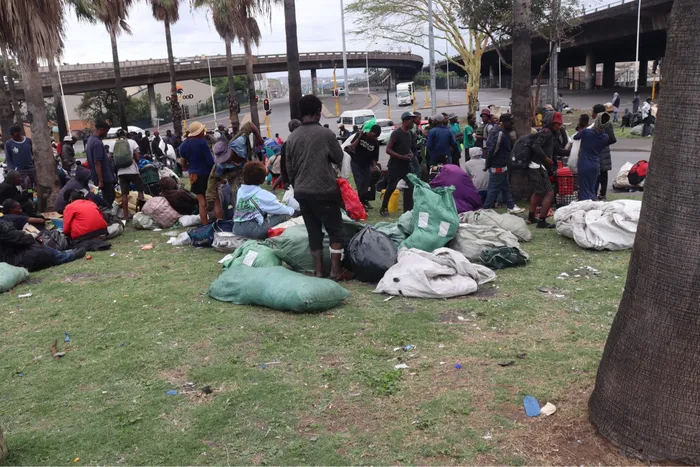eThekwini Municipality's innovative strategies to tackle homelessness

The eThekwini Municipality, through its various sister directorates, is making a concerted effort to aid, house, clean, and provide rehabilitation to the homeless, with a particular focus on drug users.
Image: eThekwini Municipality / Facebook
The eThekwini Municipality is facing an escalating homelessness crisis that impacts both development and the social fabric of the community.
Safer Cities Senior Manager Nomusa Shembe attributes this to economic hardship and personal struggles, detailing the city’s multifaceted response. She was speaking during the municipality’s eThekwini Matters podcast.
A 2016 study on homelessness in the city identified several key factors:
- Economic opportunities draw people to cities, but high unemployment leaves many without work.
- Drug addiction leads to evictions and homelessness.
- Dysfunctional families, often marked by abuse or lack of parental support, also cause individuals to leave home and end up on the streets.
Shembe noted that, around 2014, a significant number of homeless individuals were found living under a bridge and in areas used by taxi operators. This led to police involvement, prompting the city to act.
Initially, the reasons for their presence were unknown. Profiling revealed unemployment, drug abuse, and family issues. In response, the city launched the Qalakabusha programme.
Stakeholders, including departments, universities, and non-governmental organisations, were invited to address the problem collectively.
Shembe said that through Qalakabusha, they identified programmes that needed to be undertaken. They identified needs such as psychosocial support, rehabilitation, skills development, employment opportunities, and assistance with obtaining essential documents like identity documents and birth certificates.
Shembe stressed their interventions are need-based rather than strictly prescriptive.
She said a multi-stakeholder forum, led by the deputy mayor, involving NGOs, various departments, and universities, was vital in addressing homelessness.
During Covid-19, this collaboration facilitated sheltering 2,000 homeless individuals in 12 facilities. Though only three temporary shelters remain, existing stakeholder support ensures ongoing interventions.
Shembe said that back then, they successfully encouraged individuals to donate to the homeless. They also supported their training programme initiatives.
She said they can train several homeless individuals on computer skills, performing arts, and gardening skills. The gardening project, supported by Greenpop and Heineken, continues.
“This shows the partnership that we are able to maintain and sustain during Covid, which actually helped us to move into a position where we are today,” Shembe said.
“It is very difficult. I must say, it’s a complex issue, but we are making some strides.”
Shembe added that they have good relations with the Southern Sun.
“They were able to support us by taking some of the homeless people and employing them. We still have some who are employed by Southern Sun. And the good thing is that they are also looking for a new cohort of homeless people that could join the Southern Sun programme as well,” Shembe said.
“The other one is that we established with the UIP (Urban Improvement Precinct) a city changer programme. It’s run by one of the UIPs here in the city, and they’re taking the homeless people to monitor and provide security, as well as cleaning services, to one of the hotels around Suncoast. They are deployed there daily. You will see them there in blue. They are wearing blue attire. Most of them are coming from the homeless population.”
Shembe emphasised that support from stakeholders, including the private sector, NGOs, and government departments, is crucial because the city cannot tackle homelessness alone.
She said city leadership is actively addressing homelessness with positive interventions. A policy on homelessness is currently being developed and is expected to be completed by year-end.
She also said the city invested in Sakhithemba, a facility for individuals in recovery and rehabilitation who are already in shelters. Of the 560 people remaining in shelters, some have been reunited with families.
Sakhithemba will provide comprehensive support, including psychosocial services, skills training, health services, and reintegration programmes for families or independent living.
Shembe said some homeless programme participants received skills training in plumbing, electrical work, and computer numeracy through the eThekwini Municipal Academy, and are now seeking employment.
She said the city also employed some individuals through a two-month public employment programme, helping them earn income and rejoin families.
Monthly family reunifications occur, with people returning across the country and to eSwatini. The city’s outreach programmes assist those who voluntarily seek help, as individuals cannot be forced into shelters.
thobeka.ngema@inl.co.za